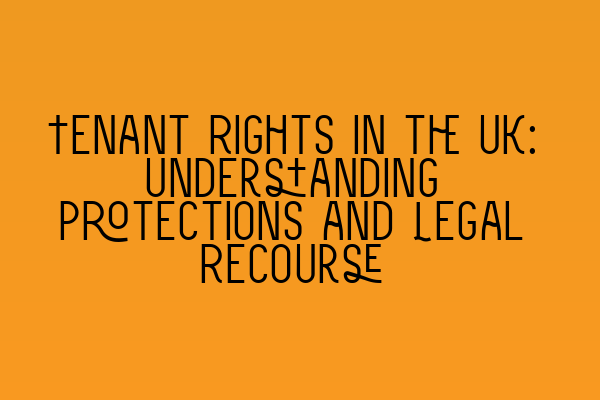Tenant Rights in the UK: Understanding Protections and Legal Recourse
As a tenant in the UK, it is crucial to have a clear understanding of your rights and the protections afforded to you under the law. Understanding these rights can help you navigate any potential disputes with your landlord and ensure that you are treated fairly throughout your tenancy. In this blog post, we will explore the key tenant rights in the UK and provide you with valuable insights on how to seek legal recourse if necessary.
1. Right to a Written Tenancy Agreement:
Every tenant in the UK has the right to receive a written tenancy agreement. This agreement spells out the terms and conditions of your tenancy, including details such as the duration of the tenancy, rent amount, and responsibilities of both the tenant and landlord. It is crucial to thoroughly review and understand this agreement before signing it to avoid any future misunderstandings.
2. Right to a Safe and Habitable Property:
Tenants have a fundamental right to live in a safe and habitable property. This means that landlords are legally obligated to ensure that the property meets certain minimum standards, such as having working heating, plumbing, and electrical systems, as well as proper fire safety measures in place. If you believe that your rental property is not meeting these standards, you should promptly notify your landlord and request necessary repairs or improvements.
3. Right to Quiet Enjoyment:
Another important tenant right is the right to quiet enjoyment of your rented property. This means that your landlord cannot interfere with your ability to use and enjoy the property without a valid reason. For example, your landlord cannot enter your property without providing adequate notice, except in cases of emergency. If you feel that your right to quiet enjoyment is being violated, it is essential to document any incidents and communicate your concerns to your landlord.
4. Right to Get Your Deposit Back:
Under the Tenancy Deposit Protection Scheme, landlords are required to protect your tenancy deposit in a government-approved scheme. Upon the end of your tenancy, you have the right to get your deposit back, provided that you have met the terms of the tenancy agreement and left the property in a satisfactory condition. If your landlord refuses to return your deposit or unfairly deducts from it, you can take legal action to recover what is rightfully yours.
5. Right to Challenge Unfair Rent Increases:
As a tenant, you have the right to challenge any unfair rent increases imposed by your landlord. While landlords have the freedom to set rent at market rates, they must follow specific procedures when increasing the rent in an assured or assured shorthold tenancy. If you believe that the rent increase is unreasonable or exceeds the market value, you can seek advice from a tenancy lawyer or contact your local authority for guidance.
6. Right to Protection Against Unlawful Eviction:
Tenants in the UK are legally protected against unlawful eviction. Landlords must follow proper legal procedures, such as obtaining a court order, before they can evict a tenant. If your landlord attempts to evict you without following the correct legal process, it is crucial to seek immediate legal advice to protect your rights and ensure that you are not unlawfully removed from your home.
Understanding your rights as a tenant is essential for maintaining a harmonious and fair tenancy. If you find yourself in a situation where your rights are being violated, it is crucial to seek legal recourse to protect yourself and assert your rights. Consulting with a specialist property law solicitor can provide you with the necessary guidance and expertise to navigate any legal challenges you may face as a tenant.
For more information on property law and related topics, consider checking out these helpful articles:
– “Updates in UK Property Laws: Key Changes and Implications”: Keep yourself informed about the latest updates and changes in UK property laws.
– “Legal challenges in property transactions: A comprehensive guide”: Gain a comprehensive understanding of the legal challenges that can arise during property transactions.
– “Navigating Lease Laws in the UK: Essential Guidelines for Tenants and Landlords”: Learn essential guidelines for tenants and landlords when navigating lease laws in the UK.
– “Dominate Property Law Questions: Avoiding Common Pitfalls”: Discover common pitfalls in property law questions and learn how to avoid them.
– “Land Law Revision Tips: Ace Your Exam Preparation”: Get valuable tips to help ace your land law exam preparation.
Remember, knowledge is power, and understanding your rights as a tenant can make a significant difference in ensuring a positive and fair renting experience.
